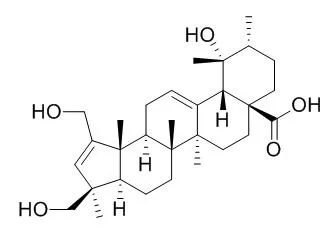| In vitro: |
| Phytomedicine. 2015 Aug 15;22(9):796-806. | | Antiproliferative activity of rosamultic acid is associated with induction of apoptosis, cell cycle arrest, inhibition of cell migration and caspase activation in human gastric cancer (SGC-7901) cells.[Pubmed: 26220626] | The objective of the present research work demonstrated the antiproliferative and apoptotic activity of Rosamultic acid, a natural triterpenoid, in human gastric cancer (SGC-7901) cells. Its effect on cellular morphology, cell cycle arrest, DNA fragmentation and expression levels of caspase-3, caspase-8 and caspase-9 were also determined.
METHODS AND RESULTS:
Antiproliferative activity of Rosamultic acid was evaluated by MTT assay. Phase contrast, fluorescence microscopy as well as flow cytometry using Hoechst 33342, acridine orange/ethidium bromide and Annexin V-FITC as cellular probes were used to evaluate the induction of apoptosis by Rosamultic acid. Protein level expressions were analyzed by western blot analysis. The results revealed that Rosamultic acid induced dose-dependent as well as time dependent cytotoxic effects in SGC-7901 gastric cancer cells. It also led to a reduction in clonogenic activity along with inhibiting the cell migration. Characteristic features of apoptosis induced by Rosamultic acid were observed and quantified. Cell cycle arrest at sub-G1 phase was induced by Rosamultic acid along with downregulation of expression levels of CDK4, CDK6 and cyclin D1. Rosamultic acid also significantly led to the activation of caspase-3, -8 and -9 during the 48 h treatment along with cleaving PARP in a dose-dependent manner. DNA fragmentation following Rosamultic acid treatment was also observed in these cells.
CONCLUSIONS:
The current study strongly reveals that Rosamultic acid inhibits gastric cancer proliferation by inducing apoptosis mediated through cell cycle arrest, downregulation of cell cycle related protein expressions, inhibition of cell migration, DNA damage, and activation of caspases. |
|






 Cell. 2018 Jan 11;172(1-2):249-261.e12. doi: 10.1016/j.cell.2017.12.019.IF=36.216(2019)
Cell. 2018 Jan 11;172(1-2):249-261.e12. doi: 10.1016/j.cell.2017.12.019.IF=36.216(2019) Cell Metab. 2020 Mar 3;31(3):534-548.e5. doi: 10.1016/j.cmet.2020.01.002.IF=22.415(2019)
Cell Metab. 2020 Mar 3;31(3):534-548.e5. doi: 10.1016/j.cmet.2020.01.002.IF=22.415(2019) Mol Cell. 2017 Nov 16;68(4):673-685.e6. doi: 10.1016/j.molcel.2017.10.022.IF=14.548(2019)
Mol Cell. 2017 Nov 16;68(4):673-685.e6. doi: 10.1016/j.molcel.2017.10.022.IF=14.548(2019)